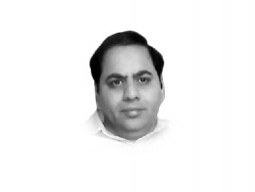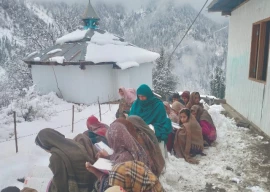
Pakistan's struggle with gender-based violence (GBV) is a multifaceted issue deeply entrenched in societal structures. Approximately 34% of young women experience physical violence and 14% women face sexual violence in their lifetime, while many cases go unreported due to fear of stigma, reprisal or lack of justice. A 2022 report by International Center of Chemical and Biological Sciences University of Karachi showed that 59% of the cases sent by Sindh Police for forensic DNA analysis comprised sexual violence against women and 8% involved violence against young boys.
Community-based healthcare providers (CBHPs), such as midwives, lady health workers (LHWs) and NGO-supported community educators, are uniquely positioned as frontline responders to GBV. These women command a degree of trust and accessibility that formal systems struggle to provide. By integrating GBV prevention and response into their existing work, CBHPs can become powerful agents of change offering confidential, non-judgmental spaces where women feel comfortable disclosing abuse. Their regular contact with women helps in identifying signs of violence, even when it is not explicitly reported.
In Pakistan, survivors of GBV often face barriers to accessing medical care, legal aid or psychosocial support. CBHPs can bridge this gap by connecting survivors to available resources. Community educators like Sitara Bajis deployed by Greenstar have shown how grassroots mobilisation can challenge harmful norms and behaviours. These women educate communities about GBV, its impact, and legal protections available to survivors.
Economic dependency is a significant factor in trapping women in abusive relationships. Women who earn are less prone to GBV at their household. In rural Balochistan, midwives trained by NGOs are selling nutritional supplements and sanitary products, enabling them to earn an income while fostering community health.
Engaging men and boys is equally critical in addressing GBV. By educating men about the consequences of GBV, and challenging traditional notions of power and control, such programmes foster healthier relationships and communities.
CBHPs can organise workshops and discussions tailored to men including religious leaders, focusing on the impact of violence on families and the importance of shared responsibility in creating safe environments. Such initiatives can dismantle harmful stereotypes and promote respect and equality in relationships. These men can become role models for the rest of the community.
Grassroots efforts have shown promising results in Pakistan. An LHW-led initiative in Khyber Pakhtunkhwa successfully delayed numerous childhood marriages - a form of GBV - by educating families on its health and social consequences. Similarly, in Karachi's Orangi Town, Sitara Bajis trained under Greenstar's programmes have begun addressing intimate partner violence through health education sessions and referrals to local NGOs. These efforts highlight how community-based approaches can challenge entrenched practices and slowly shift community attitudes toward greater respect for women's rights.
While the potential of CBHPs to combat GBV is undeniable, they face significant challenges, including inadequate training, lack of resources, and societal resistance. Incorporating GBV modules into training curricula for CBHPs can equip them with the skills and confidence to address such issues effectively. Additionally, providing mental health support to CBHPs themselves is crucial, as their work often exposes them to trauma.
Collaboration with NGOs, government programmes and donor agencies can amplify these efforts. For example, the Pakistan Gender-Based Violence Response Framework, developed by the government, can integrate CBHPs as key stakeholders in GBV prevention and response strategies.
As the 16 Days of Activism unfold, it is imperative to recognise the transformative role CBHPs and male allies can play in addressing GBV in Pakistan. Let this period of activism be a call to action - not just for 16 days, but every day until violence against women is no longer a reality but a distant memory.

1730360426-0/Menendez-Brothers-(2)1730360426-0-405x300.webp)


















COMMENTS
Comments are moderated and generally will be posted if they are on-topic and not abusive.
For more information, please see our Comments FAQ